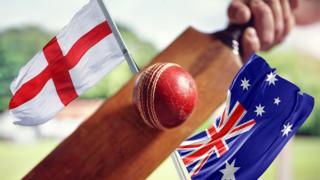 Image copyright
Getty Images
Image copyright
Getty Images
It's one of the oldest and most enduring rivalries in sport.
And today it's renewed once more, as England take on Australia for a place in the final of the Cricket World Cup.
The fans will be fired up - as will the players - as they take on an old enemy.
So why is there such a long-running beef between these two teams in particular?
To answer that question, you need to travel back almost 150 years.
Because although today's match will be a one-day game, the intense rivalry has its roots in the history of Test cricket between the two sides.
And it all started with a tiny pottery perfume jar.
Ashes to Ashes
Cricket has its roots in 16th Century England, but the first international matches were played in the late 1800s.
An England team played in Australia in 1877, in what are regarded as some of the first ever international Test matches, and a return series was held five years later.
It was after those games in 1882 that a sporting newspaper made a joke that became part of history.
The Sporting Times ran a fake "obituary for English cricket" that concluded "the body will be cremated and the ashes taken to Australia".
So when England set off for their next games against Australia, captain Ivo Bligh was able to say he was aiming to win back "the Ashes".
And that's why the name is used every time England and Australia contest a Test series.
The famous urn, which is now on display at Lord's Cricket Ground, was presented to Ivo Bligh in Melbourne. It's claimed it contains the burned remains of a cricket bail - though we are at the point where sporting fact blurs with sporting legend.
The urn is far too delicate to be used as an actual trophy - a crystal replica is now presented to the winning team.
What is certain is that the Ashes is one of the most famous and longest-lived international rivalries in sport.
It's a battle that will be fought again this summer shortly after the World Cup has finished.
Bodyline bowlers and swearing sledgers
The beef has become ever more heated as the years have gone by.
Any cricket fan will tell you that the "Bodyline" series is one of the most controversial ever played.
In the early 1930s, England captain Douglas Jardine instructed his bowlers to aim directly at the Australian batsmen, including the legendary Don Bradman.
There was an outcry - and the laws of the game were changed as a result.
But some of the verbal tactics employed by both sides have been equally devastating at times.
"Sledging" - what most of us would call good old-fashioned heckling - has become an integral part of any game between these two teams.
Some of the most memorable can't be repeated here - but bowler Merv Hughes once claimed sledging was responsible for a quarter of the wickets he ever took.
Hughes once asked England's Graham Gooch: "Would you like me to bowl a piano and see if you can play that?"
Cricketing Twitter
The age of social media has given the world a whole new place to insult each other, even when the cricket's not on.
Cyber-sledging, you might call it, if that didn't sound too much like a bad virtual reality game.
Take, for instance, this aggressive delivery from Michael Vaughan when both Australia's men and women lost on the same day in 2018.
Though Vaughan isn't averse to insulting the odd England player along the way as well.
We're only scratching the surface here - entire books have been written on this subject.
But a bit of potted history should go some way to explaining why England v Australia is always a little more significant than mere numbers on a scoreboard.
Follow Newsbeat on Instagram, Facebook, Twitter and YouTube.
Listen to Newsbeat live at 12:45 and 17:45 weekdays - or listen back here.